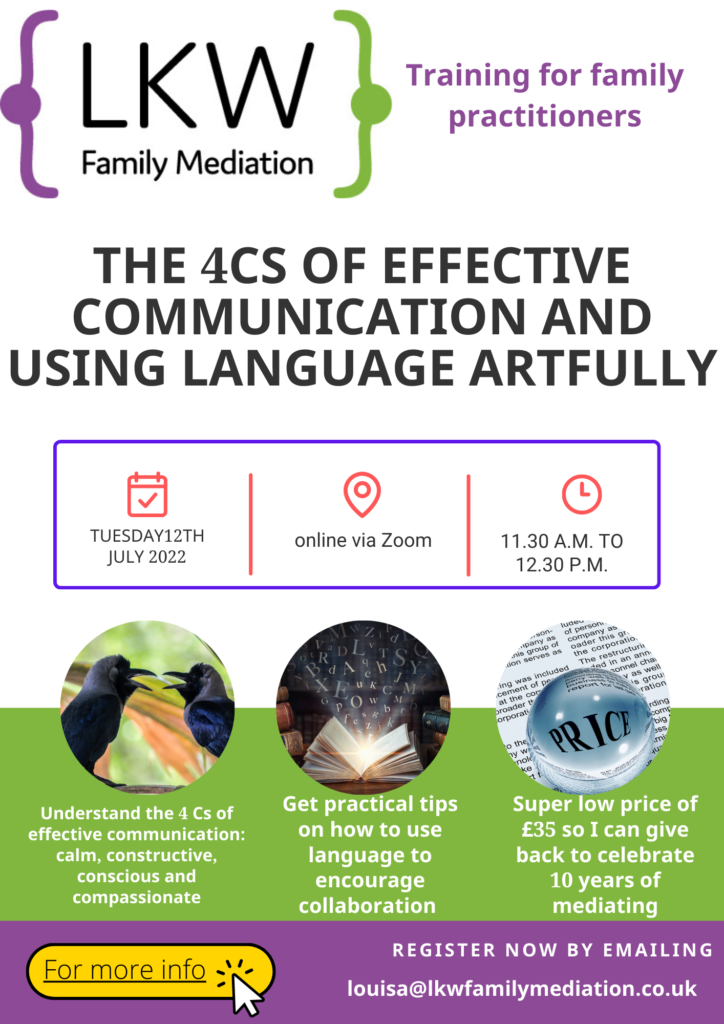Louisa Whitney writes:
You might have seen me talking on social media about the 4 Cs of effective communication and I thought it would help to write a blog about them in more detail. They are the four fundamental pillars of communication. They’re fundamental because as with table legs you need all the legs for the table to stand securely and not fall over. The same is true of good and productive communication.
Before I explain more I just wanted to talk a little about why this is important. What is the point of communication and why does it need to function well? The simple truth is that it is impossible for two or more people to achieve anything if they can’t communicate well. If you ask a builder to build an extension and aren’t clear about how big you want it to be, or how high, you are unlikely to get what you want. If you aren’t clear with your waiter about what you’re ordering how can you expect to get the meal you desire?
In an office setting teams cannot function if everyone isn’t clear about their role and what actions you need to take. It doesn’t matter how incredible you are at your job, if other people aren’t doing what you’re expecting them to things are unlikely to pan out well.

If you’re separating from a partner then effective communication matters enormously for the following reasons:
- You have solutions to find to a number of issues. These may include: where you will each live, how you will make ends meet, when your children will be with mum and when they will be with dad, how you will support your children with this life change, how will you divide the furniture and other items in your house. Without understanding what you each want and your priorities and objectives it is extremely difficult to fund mutually agreeable solutions to these issues.
- You will likely need the services of lawyers, mediators and possibly other professionals to assist you. How much you need them (and thus how much their support will cost) can often be decided by how able you are to communicate outside of the legal or mediation process. If every single thing has to be negotiated in mediation, or with lawyer support, then it will mean a bigger bill for this.
- If you are parents then you will always be parents to your children. If your children are younger then there will be school events where they’d like you both to attend, pick ups, weekends and school holidays to sort out. Even once your children are more independent there will be big occasions like graduations, weddings, grandchildren and other special occasions that your children would like to mark with their parents (and potentially any step parents and other family members). If you’re not able to have even the most basic of communication it makes such things much harder to organisation and mean the burden and responsibility for such arrangements is more likely to fall on your children.
- If you can communicate effectively you are your own mouth piece. You don’t need anyone to speak for you and you therefore significantly reduce the risk of miscommunication and misunderstandings.
- Being able to communicate in a functional way between the two of you (even if it’s just civil rather than warm or welcoming) reduces the stress that you both feel because you know you can work things out and you won’t need to involve third parties, incur costs or deal with the fallout of a significant misunderstanding.
So what are the 4 Cs that are the four pillars of communication?
They are Calm, Constructive, Conscious and Compassionate. I’ve outlined what I mean by each one and its function below.
Calm
This is perhaps the easiest one to explain as most people understand the principle of remaining calm. Unfortunately in our stressed out, overstimulated and overwhelming world we don’t always know that we’re not calm until we “lose it”. Too many of us live life frazzled and on the edge of burnout and never understanding why we snap so often or are suddenly reduced to tears.
When we add in a significant life event like a separation what was already stretched can move to breaking point. If you are in fight or flight mode then you are living in your sympathetic nervous system. Being regularly in this stage – or for prolonged periods of time – can be detrimental to your health, and you can effectively get stuck in this stage. It’s important to note that you don’t have access to your full brain functioning in this state. It doesn’t matter how hard you might try, it’s a physiological state that prevents you being able to access parts of your brain that deal with reasoning.
Learning how to find the fastest route back to calm, and therefore the parasympathetic ‘rest and digest’ nervous system, and full brain functioning, is an essential life skill to have but many people don’t have it. Do you know how to turn yourself from wound up like a clockwork mouse to a little more zen? If you don’t know how to do this and can’t always recognise when you’re not calm then this can be a huge barrier to effective communication.
Different people find different tools effective. Here are some tools that might be effective:
- exercise (be that a gentle yoga practice, a walk around the block or something more invigorating)
- Distraction by way of doing something completely different
- Meditation or something meditative like mindful colouring (for some people it can be hard to go directly from wound up to this)
- Sounds (for some music can be hugely useful as well as guided meditation or things like ocean sounds)
- Breath

I will dwell on breath for a moment because whilst the other strategies are helpful it is breath that for me is the fastest route between different states and the fastest route to feeling calmer. This might be when faced with a challenging situation, or when you’re struggling to get back to sleep. There are many different breathing exercises you can do and you can find amazing breath practitioners like James Nestor or James Dowler and others sharing tips on Instagram. The fundamental point is that when we are stressed, anxious, upset, angry or feeling other intense feelings our breath tends to become very shallow which contributes to the body’s sense that something bad is happening. If we can slow down our breathing – in whatever way feels right for us – then we can usually return to a calmer state – even if it takes far more breaths than you might think it does.
Constructive
This pillar is intensely practical and often relates to understanding how language can be made more constructive. Here are some simple tips for those trying to find solutions following a separation:
- “Our” children will always elicit a more constructive response than “my” children
- Any question that starts with why is usually met with a defensive response as the other person feels they have to justify themselves (see also questions that start with what)
- Usually I language can be a more constructive way of broaching a difficult point. I’m curious to know; I’d like to understand; I’m just wondering about this
- Ensuring the other person feels heard is also really important in constructive conversations. Helping someone to feel heard and understood doesn’t mean you agree with them. It just means you’re genuinely interested to understand their viewpoint. Acknowledging their priorities or worries or the emotion they’re feeling can be really powerful. It can also help to summarise what you think the other person is saying to check you’ve understood
- Seeing the issue you’re trying to solve as something external to you both is also useful. If you see the problem as the other person then you tend to get stuck in who’s right and who’s wrong. If you can see it as something that you both need to work together to resolve then this can be a more constructive viewpoint
There is often a desire to be amicable in a separating couple but this is closely followed by a frustration that communication doesn’t feel effective or positive. Following tips like these can help both parties to feel things are constructive. If you feel a discussion is constructive then you’re much more likely to stick with it and to actively look for solutions rather than closing down, or giving up. Ask yourself do I come across as constructive?
Here are a couple of things to avoid if you want to seem constructive:
- Telling the other person what they should do or where they’ve made a mistake. If you’re not sure if that’s what you’re doing ask yourself how you’d feel if they said to you what you’re about to say to them.
- Passing judgement on decisions or views expressed by your ex-partner. It’s OK to disagree and for you to feel differently but if you can treat their views as valid it helps things feel a whole lot more constructive.
- This is the biggie: try to avoid telling anyone they shouldn’t feel the way they do. You might think something is an overreaction or the wrong response but feelings are all about the person having them. We all have our own life experiences and views and these inform our thoughts, feelings and actions. They are a response to who we are and things that have happened to us. Treating the other person’s feelings as valid (even if you think you would feel differently) is an essential part of being constructive.
Conscious
This is probably the hardest part to explain. I mean you can’t really communicate when you’re unconscious! Mindful might perhaps be a more easy to understand pillar but then it wouldn’t begin with C and the 4 Cs concept would fall down!
Essentially by conscious I do mean communicating mindfully so focusing on what you’re saying (and how you’re saying it) and your reactions rather than allowing this to be driven by knee jerk emotional responses. I also mean focusing on the other person so you can show that you are interested in what they’re saying. We all know that when you’re trying to make a point that’s important to you, someone else looking at their phone, or huffing and puffing, or trying to interrupt doesn’t assist you in feeling heard and understood.
There’s also a deeper meaning that might be harder to explain. If you’ve read the Celestine Prophecy by James Redfield then you may already understand this. This book gives 9 insights (and there are further insights in subsequent books) which I would describe as wisdoms to live by. They are spiritual teachings on life, humans and how we interact. Among them it talks about charging ourselves up with energy by seeing beauty in nature so that we are living from a place of having our own cup full. The eighth insight shares how to focus this energy and to send it to others when they are sharing and talking. They talk about conscious discussions and how each person intuitively knows when it is their turn to share their wisdom and the responsibility of the group is to send energy to the speaker so that the speaker is able to share their wisdom with the group as the group then benefits.
You might be on board with such an idea or you may be feeling confused or sceptical. Just remember that all feelings are valid 😉

Compassionate
This is probably easy enough to understand on an intellectual or head level but harder to put into practice or to feel in the heart. It’s understandable that you might not feel compassion towards an ex-partner. You may feel hurt, anger, or strong sadness as well as many other emotions. When you feel like this it’s easy to close yourself off and to feel that they do not understand what you’re going through, and that they are faring much better than you and will be better off (financially, emotionally or in some other way). This is rarely completely true and in 20+ years of working with those going through a separation I have never seen anyone completely unaffected by their separation. It just affects people in different ways and sometimes people do their hardest grieving before telling their partner they want to separate.
If you can give your ex-partner the benefit of the doubt then this can help open the door to compassion. Perhaps they have felt upset or guilty or hurt too? They might also worry about their future and what it will be like. Can you work from the point of view that they are trying to suggest what is best for everyone but you simply disagree about what is best?
Finding compassion is not about agreeing with someone when you think they’re wrong. It’s simply about accepting that they have feelings and that their feelings are valid too. It’s about accepting they might have their reasons for their views and feelings just as you do.
If you can come from your heart in your interactions then this tends to change the tone in conversations and this is why it’s one of the pillars of effective communication. Yeah right people often say but what’s the point in being compassionate if they’re going to throw it back in my face? It’s a valid point and opening your heart in a different way to someone who has hurt you is not an easy exercise at all. It takes strength and courage.
Would it help if I explained that it is ultimately for your benefit? As with forgiveness when we carry heavy emotions, grudges and resentments it is a load that we bear as the person carrying it. It is our body that struggles with the burden and not the other person’s. If we can free ourselves from this weight then we are freeing ourselves and lightening our own backpack and so we will feel the benefit. It is in all ways an act of self-compassion, and often we need to receive compassion in order to be able to give it. You can’t pour from an empty cup. So having compassion for yourself can be the first step in building this pillar. Maybe you need to forgive yourself for things you did, or didn’t do? Perhaps for the fact your relationship didn’t work out as you had intended it to? Be kind to yourself and compassionate and accept that things don’t always pan out as we’d like them to. It might not resonate yet but sometimes that can be because there are even better things round the corner.
Lastly, I’d like to say a little word about the heart space. Call it the heart space, the heart, the heart chakra – whatever feels right for you. From years of self-doubt, negative thinking, trials and tribulations I have learnt that I am in my best possible space when my feet are firmly planted on the ground and I am approaching life from my heart space. Looking at all situations through the lens of my heart and therefore compassion. From this space I can feel the storm around me but it cannot knock me over or break me. I can feel the emotions of all that is going on around me, and I can be touched by them. But I am not going to be overwhelmed by them. I will bend and not break as my brilliant yoga teaches says.

When I am in this space I am truly standing in my power and that is why it needs to be included. Part of having these four pillars and looking at the depth of them, is not just to sticking plaster over difficulties or just fudge a solution; it’s to truly look at what is the best things can be. Sure you won’t be there all the time, and the journey to find it might take some time, but it is absolutely worth finding that space, and if you know it’s there it inspires you to keep going when things are challenging and tough and you feel like giving up.
If you’re going through a separation and thinking you’re struggling to find self-compassion, let alone compassion for your ex then this might help. Why not sign up for our free 5 days of loving and inspiring messages (with a bit of separation support thrown in). They’re designed to help inspire you to finding self-compassion and to help you feel loved at this challenging time.
If you’re a family lawyer, mediator or other practitioner reading this then you might be interested in a workshop I’m running on 12th July. It’s the lowest price workshop I’ve ever run to give back to all those who have supported me as it’s 10 years since I qualified as a mediator. If you’d like more info then click here.


One comment